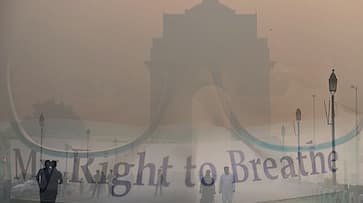Earlier, the EPCA had asked to halt all construction activities, including excavation, civil construction, stone crushing and operation of hot mix plants in the Delhi-NCR region
New Delhi: With Delhi's air quality just three notches away from turning “severe”, the Environment Pollution Control Authority (EPCA) stepped in on Tuesday and set November 1 as the deadline for reducing pollution.
The EPCA chairman said that all the private vehicles in Delhi would be withdrawn from the streets and only public transport allowed to ply if the pollution level was not brought under control by the deadline.
Earlier, the EPCA had asked to halt all construction activities, including excavation, civil construction, stone crushing and operation of hot mix plants in the Delhi-NCR region.
“The EPCA has been advised by the task force on graded action plan (GRAP) that the coming period, beginning from November 1, is projected to have adverse weather conditions, which will worsen the existing situation. All efforts have to be made to ensure that the levels do not rise further. The task force had advised EPCA to come up with some additional measures to combat air pollution,” the agency said, according to an Indian Express report.
The EPCA on October 29 had informed the Supreme Court that commercial vehicles like trucks and taxis are the major source for pollution in the region.

Stubble burning
Heavy stubble burning has increased pollution in the capital city in the past 24 hours.
An overall air quality index of 397 was recorded. It falls in the 'very poor' category, according to data of the Central Pollution Control Board (CPCB).
An AQI between 0 and 50 is considered 'good', 51 and 100 'satisfactory', 101 and 200 'moderate', 201 and 300 'poor', 301 and 400 'very poor', and 401 and 500 'severe'.
Stubble burning leads to increase of PM2.5 (particles in the air with a diameter of less than 2.5 micrometres) also known as fine particulate matter.
PM2.5 for the past 24 hours was recorded at 217 on Tuesday, the highest of this season. Fine particulates are a matter of more serious health concern than PM10.

Adverse effect
In 2016, over 1,00,000 children under five years of age died in India due to exposure to toxic air, according to a new World Health Organisation study.
According to the study, it was revealed that about 98% of children in the same age group in low and middle-income countries were exposed to air pollution.
At least 6,00,000 children died from acute lower respiratory infections across the world last year.
Last Updated Oct 30, 2018, 5:09 PM IST









![Salman Khan sets stage on fire for Anant Ambani, Radhika Merchant pre-wedding festivities [WATCH] ATG](https://static-gi.asianetnews.com/images/01hr1hh8y86gvb4kbqgnyhc0w0/whatsapp-image-2024-03-03-at-12-24-37-pm_100x60xt.jpg)
![Pregnant Deepika Padukone dances with Ranveer Singh at Anant Ambani, Radhika Merchant pre-wedding bash [WATCH] ATG](https://static-gi.asianetnews.com/images/01hr1ffyd3nzqzgm6ba0k87vr8/whatsapp-image-2024-03-03-at-11-45-35-am_100x60xt.jpg)


